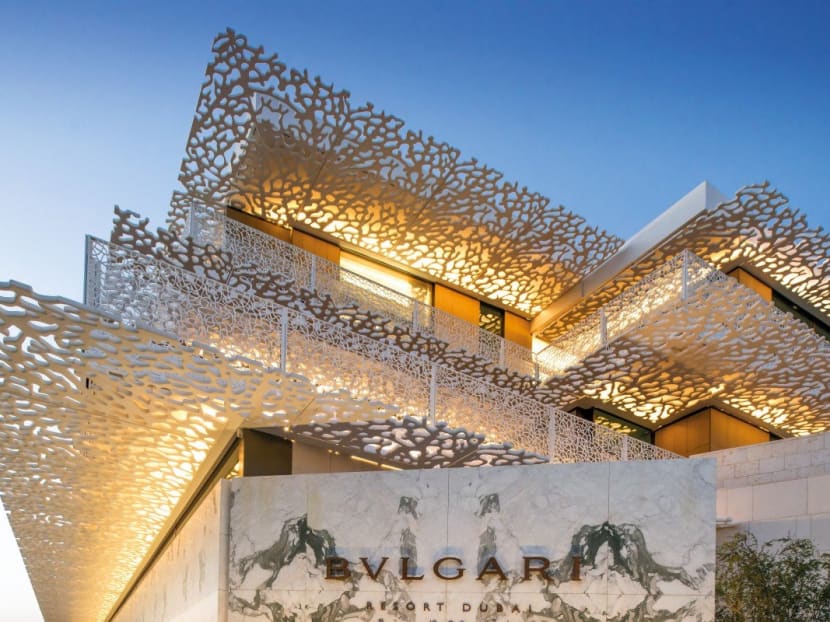Bulgari, Armani, Versace: Why luxury fashion brands open hotels as more get into the game
HONG KONG — Late last year LVMH made headlines when it announced it was acquiring travel and luxury hospitality group Belmond. While it was not the luxury conglomerate’s first foray into hospitality – it owns and operates its own brand of hotels called Cheval Blanc – it signalled a larger trend that has seen more fashion and lifestyle brands enter the hospitality sector.

The Bulgari Resort in Dubai, one of the luxury brand’s six hotels around the world. It has three more planned to open by the end of 2022.
HONG KONG — Late last year LVMH made headlines when it announced it was acquiring travel and luxury hospitality group Belmond. While it was not the luxury conglomerate’s first foray into hospitality – it owns and operates its own brand of hotels called Cheval Blanc – it signalled a larger trend that has seen more fashion and lifestyle brands enter the hospitality sector.
“Fashion and hospitality are both aspirational, experiential and a reflection of one’s lifestyle, so there are plenty of synergies there,” says Ms Catherine Feliciano-Chon, managing partner of marketing agency CatchOn.
“Being able to have a physical space beyond a conventional retail store is immensely powerful in bringing that brand to life and opens them up to a lot of other product categories, like furniture.”
The fashion-branded hotel emerged in the early noughties when Versace opened its first Palazzo in Australia. Brands including Armani and Ferragamo followed (the latter built its own portfolio of hotels under the Lungarno Collection), while fashion designers started collaborating with hotel groups on interiors and other projects.
Today the market is dominated by several players including Bulgari, which currently boasts six hotels with three more planned to open in Moscow, Tokyo and Paris by the end of 2022.
“The hotel industry is a very different business from fashion, so not all the brands that started this venture were successful,” says Mr Silvio Ursini, vice-president of Bulgari Hotels and Resorts. “At the moment only a very few ‘fashion’ brands are still present in the hospitality scene.
Consistency with brand values and identity is the key for success in any diversification process, but in the hospitality sector it is particularly challenging and the reason why it is still a growing trend.”
Unlike their predecessors, the new generation of branded hotels are built around the idea of creating experiences and communities.
The luxury watchmaker Audemars Piguet, for example – which recently announced it would be opening its first hotel – did not choose a thriving capital like London or Zurich for its property, but the small village of Le Brassus in Switzerland’s Vallée de Joux, where its headquarters and manufacturing facilities are based.
Guests will be able to ski down the hotel’s zigzagging roof or visit the nearby Musée Atelier Audemars Piguet, which will feature over 1,300 timepieces.
“The real value of these type of operations, as well as the return on investment, lies in the possibility to tap into alternative marketing tools and create an experiential channel,” says Ms Cristiana Schiavolin, a management consultant working with direct-to-consumer brands and retail operators.
“Much of retail has lost its human touch, but hospitality still delivers analogue experiences people are longing for, such as access to a community sharing similar tastes and values.”
A similar proposition has influenced plans for the latest Cheval Blanc property in London. As well as opening the hotel in the city’s Mayfair district, the group will redevelop parts of the neighbourhood.
The hotel will be linked to restaurants, an underground spa, high-end retail outlets and the first-ever Louis Vuitton cafe, creating a hub rather than just a stand-alone hotel.
These new fashion hotels will continue to evolve as younger customers come to the fore. More mobile and worldly than the generation before, these travellers are more likely to pay for branded experiences versus a luxury product, making hotels the ideal place to spend their money while learning about the brand through a different channel.
Promoting a particular “culture” will also become increasingly important, as evidenced by cheaper brands like Shinola and Muji launching their own hotels.
“We live in a world of ‘tribes’ that have different preferences, inclinations to shopping and purchasing powers,” Ms Schiavolin says. “Most importantly, they each value their cultures. Adamantly, Shinola and Muji hotels talk to a customer who appreciates design and does not necessarily need a luxury environment. It’s about a service philosophy.”
But the long-term success of any hotel comes down to more than just branding. Operations require specific knowledge and expertise, which is why potential partnerships with other hotel groups could only drive this trend further.
“Simply put, fashion brands don’t know how to run hotels,” Ms Feliciano-Chon says. “So while they may lend their name or create a branded concept, they still rely on a hotel group to run it. Bulgari is a good example as it’s part of the Marriott group.
“With the case of LVMH, having Belmond as part of their portfolio strengthens the resources of Cheval Blanc. I’m betting that Belmond will be providing the operational and human resources to help Cheval Blanc grow.” SOUTH CHINA MORNING POST






